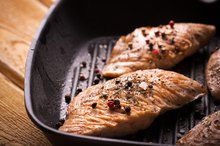How Much Fat Should I Eat on Atkins?
It's no secret that eating too much steak and bacon is bad for your health. But if you're following the Atkins diet, you may be eating these high-fat meats to lose weight. While the Atkins diet receives a lot of criticism for its fat content, studies indicate that it is effective at helping people drop unwanted pounds. What's not known are the long-term consequences of high intakes of fat. Consult with your doctor if you're considering the Atkins diet to help you lose weight to discuss benefits versus risks of the low-carb diet plan.
How Much Fat on Atkins
Based on information provided by the Atkins website, about 55 to 60 percent of calories on the plan comes from fat. Depending on the number of calories you consume on the diet plan, which ranges from 1,500 to 1,800 calories for women and 1,800 to 2,200 calories for men, the amount of fat you might consume in a day may be anywhere from 90 to 150 grams depending on the types of foods you include in your diet.
Carbohydrates serve as your body's primary source of energy. When your body does not get enough carbs, it uses fat for fuel in the form of ketones, which includes the fat from your diet, as well as the fat stored in your body. This is how Atkins helps you lose weight, according to the Atkins website.
Fat Choices on Atkins Diet
Atkins Diet and Liver Problems
Learn More
While the Atkins diet allows high-fat meats such as hamburgers and sausage, it also includes healthier protein and fat options. The traditional program, known as Atkins 20, is broken into stages, in which the amount of carbs you're allowed is restricted to 20 grams a day at the start and increases slowly as you lose weight. The diet also includes a newer, less carb-restricted plan called Atkins 40, which limits carb intake to 40 grams a day to allow for a greater variety of food intake from the start, including specific fruits and vegetables. Fat choices on both the 20 and 40 plans are the same, and both plans include oils -- such as olive, coconut and flaxseed -- mayonnaise, salad dressing and butter. Additionally, protein options for both Atkins plans are the same and allow you to choose from healthier options such as a chicken breast, fish, eggs and high-fat meats such as sausage or bacon. As your carb allowance increases, you're allowed other foods high in healthy fats that also contain some carbs, such as nuts and seeds.
Benefits of Healthier Fats on Atkins
Low-fat diets used to be the go-to diets for weight loss and heart health, but research has shown that not all fat is bad for you. Eating a higher percentage of your calories from fat can help you lose weight just as well as a low-fat diet can, according to a 2009 study published in the New England Journal of Medicine. However, if you decide Atkins is your kind of diet, you may want to include more of the healthier fat options, which include vegetable oils, fatty fish, avocados, nuts and seeds. Foods high in saturated fat -- such as red meat, bacon and butter -- may not be good for your health when eaten in excessive amounts.
Pros and Cons of Atkins Diet
Can Coconut Oil Clog Arteries?
Learn More
The Atkins diet can help you lose weight, and the new Atkins 40 is a more balanced approach to weight loss. However, while Atkins claims that it helps you lose weight by throwing you into a state of ketosis, the diet actually helps you lose by reducing your overall caloric intake. It also almost entirely omits a major food group, grains, which may affect nutrient intake and make the diet more difficult to follow long-term. Additionally, if you don't choose the healthier fat options suggested by the diet plan, you may consume an excessive amount of saturated fat on the Atkins plan.
Related Articles
References
- Diets in Review: Atkins Diet
- New England Journal of Medicine: Comparison of Weight-Loss Diets with Different Compositions of Fat, Protein, and Carbohydrates
- Atkins: How It Works: 20 FAQs
- Helpguide.org: Choosing Healthy Fat: Good Fats, Bad Fats and the Power of Omega-3s
- Atkins: How It Works: Compare Atkins Diet Plans
Writer Bio
Jill Corleone is a registered dietitian and health coach who has been writing and lecturing on diet and health for more than 15 years. Her work has been featured on the Huffington Post, Diabetes Self-Management and in the book "Noninvasive Mechanical Ventilation," edited by John R. Bach, M.D. Corleone holds a Bachelor of Science in nutrition.









